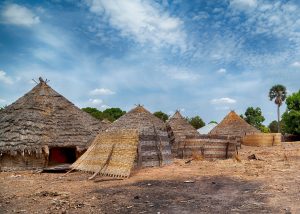
Proposed United Kingdom Trophy Hunting Import Ban Threatens African Conservation Success, Ignores International Agreements
MEDIA RELEASE
21 November 2024
For Immediate Release
Proposed United Kingdom Trophy Hunting Import Ban Threatens African Conservation Success, Ignores International Agreements
Key Messages:
- The UK’s Labour Party, now in government, has pledged to ban hunting trophy imports. This commitment, included in their election manifesto, recently took form in Parliament as a Private Member’s Bill, introduced as a presentation bill in Parliament.
- A poll commissioned by Resource Africa reveals that 75% of UK citizens mistakenly believe trophy hunting poses a major threat to endangered species, and 83% would support a ban even if it harmed African livelihoods.
- A recent scientific study concludes that trophy hunting is not a significant threat to CITES-listed species imported into the UK over the past 22 years, with nearly 80% of imported trophies coming from countries where populations are stable, increasing, or abundant.
- Evidence highlights that trophy hunting delivers essential conservation and social benefits, such as anti-poaching funding, local employment, and protection of wildlands.
- The UK government’s impact assessment of the proposed bill lacks a full evaluation of the costs and benefits to local African communities, and the Institute of Economic Affairs warns that such a ban undermines African sovereignty and conservation strategies.
Southern Africa Speaks Out Against UK’s Disregard for Conservation Realities
The UK’s recent introduction of the Hunting Trophies (Import Prohibition) Bill signals troubling momentum toward restrictive trophy hunting legislation. Although introduced by an opposition MP, the bill highlights a persistent disconnect in the UK’s understanding of African conservation, where scientific evidence and effective local practices are ignored in favour of populist narratives.
Disputing the Rationale Behind the Bill
A recent analysis led by conservation scientists from Oxford University reveals critical flaws in the reasoning behind the proposed trophy import ban. This research shows that trophy hunting is not a primary threat to any CITES-listed species imported into the UK. Between 2015 and 2021, nearly 80% of UK-imported hunting trophies came from countries where the populations of hunted species were stable, increasing, or abundant. Furthermore, controlled trophy hunting is proven to support conservation initiatives by funding anti-poaching efforts, creating jobs, and preserving natural habitats, which help safeguard biodiversity and support local livelihoods.
Misinformation and a Lack of Empathy in the UK
Resource Africa’s recent poll reveals a substantial knowledge gap among UK citizens, with 75% mistakenly believing that trophy hunting endangers species. More troublingly, 83% would support a ban even if it negatively impacted the livelihoods of rural African communities. This level of misinformation, combined with a lack of empathy for African perspectives, threatens to drive policy decisions that harm Africa’s conservation and economic successes.
“There seems to be a profound disconnect between public perception in the UK and the realities faced by African communities,” said Dr. Shylock Muyengwa, Programmes Director for Resource Africa. “The policies being shaped by this misinformed support of a ban threaten the hard-won conservation successes across Africa.”
A Call for Unity and Assertive Response
Southern African governments are encouraged to voice a unified stance against the proposed UK policy, which disregards both internationally recognised frameworks and Africa’s sovereignty in shaping its own conservation strategies. The UK ranks 123rd globally in conservation, while six African countries are in the top 10 for conserving large wildlife populations—thanks in part to revenue from sustainable trophy hunting. “Southern Africa’s leadership in conservation demands respect and the freedom to determine local policies without foreign interference”, Dr. Muyengwa added.
Educating the Public and Advocating for Balanced Policies
The Hunting Trophies (Import Prohibition) Bill serves as a reminder of the need for balanced conservation policies informed by evidence, not public sentiment alone. “It’s hypocritical for the UK to impose bans on African trophy imports while refusing to regulate its own hunting industry,” said Dr. Francis Vorhies, Director of the African Wildlife Economy Institute (AWEI and author of Elephant in the Room: Why a trophy hunting ban would hurt conservation and development. “Our recent study reinforces the importance of balanced and informed policies that genuinely support wildlife conservation and local communities.”
ABOUT RESOURCE AFRICA
Resource Africa supports rural African communities in securing their rights to sustainably manage their natural resources. By building platforms for collaboration, knowledge sharing, and advocacy, Resource Africa ensures that the voices of those who live with wildlife are heard in global conservation debates.
ABOUT THE AFRICAN WILDLIFE ECONOMY INSTITUTE
The African Wildlife Economy Institute (AWEI) is a think tank based at Stellenbosch University in South Africa. It focuses on enhancing the enabling environment for sustainable and inclusive wildlife enterprise through strategic thought leadership, stakeholder engagement, and professional development. It does so through collaboration with professionals and organisations interested in unlocking the potential for the wildlife economy across Africa. The report Elephant in the Room: Why a Trophy Hunting Ban Would Hurt Conservation and Development by Dr Francis Vorhies, AWEI Director, was released by the UK-based Institute of Economic Affairs (IEA) and exemplifies the mutual commitment of AWEI and IEA to highlighting the unintended consequences of policy decisions for wildlife conservation and economic development.
Resources:
- Poll on UK Attitudes Towards a UK Hunting Trophy Import Ban: https://www.resourceafrica.net/uk-attitudes-towards-hunting-trophy-imports/.
- Challender, D.W., ‘t Sas-Rolfes, M., Dickman, A., Hare, D., Hart, A.G., Hoffman, M., Mallon, D., Mandisodza-Chikerema, R.L. and Roe. D, 2024.Evaluating key evidence and formulating regulatory alternatives regarding the UK’s Hunting Trophies (Import Prohibition) Bill. Conservation Science and Practice, p.e13220.
- Elephant in the Room: Why a Trophy Hunting Ban Would Hurt Conservation and Development: https://iea.org.uk/publications/elephant-in-the-room-why-a-trophy-hunting-ban-would-hurt-conservation-and-development/
ENDS
For media inquiries, please contact:
Lara Rall
Head of Network Communications
Jamma International


